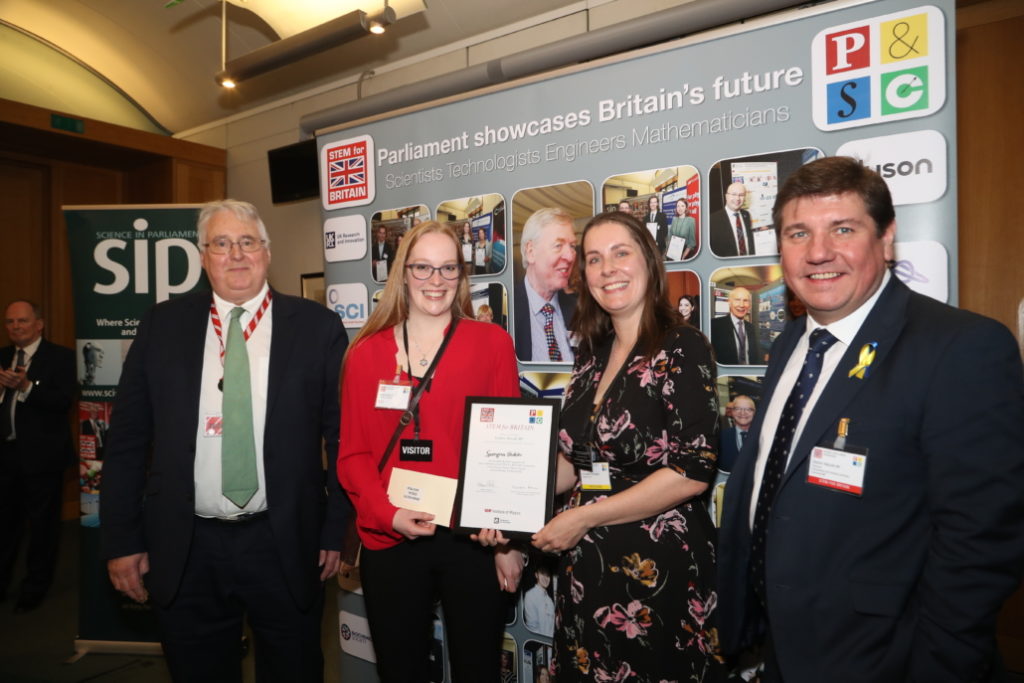Silver Award in Parliament for Georgina

Group member Dr Georgina Shillito has taken the Silver medal for the excellence of her research at the prestigious national competition STEM for BRITAIN 2022, held at the Houses of Parliament in Westminster.
The Parliamentary and Scientific Committee runs STEM for Britain in collaboration with the Institute of Physics and other learned societies – the Royal Academy of Engineering, Royal Society of Biology, Royal Society of Chemistry Physiological Society, Council for the Mathematical Sciences, and the Nutrition Society.
The event showcases the best of UK scientific research being carried out by early career researchers, and is in the only national competition of its kind. It aims to help politicians understand more about the UK’s thriving science and engineering base, and rewards some of the strongest scientific and engineering research being undertaken in the UK. Finalists present a poster describing their research, and must answer examining questions from a team of judges.
Georgina was part of a field of strong finalists in the Physics session of the competition, which is sponsored and supported by the Institute of Physics; the professional body and learned society for physics in the UK and Ireland.
Her poster described how she uses laser light to extract the unique chemical fingerprint of concealed samples of liquids and solids, in order to find out what they are, their purity and other characteristics – without even opening their containers.
The technique can be used to identify samples in opaque containers by creating a ‘metaphorical window’ to allow the contents within to be examined, and it is achieved using a variation of a technique known as Raman spectroscopy, which Georgina and her colleagues worked to develop and improve.
Raman spectroscopy provides information or a ‘chemical fingerprint’ of a sample. It is traditionally performed by focusing a laser onto a spot on the surface of the sample being studied. Scattered light that provides information about the substance is collected from this point. However, if the sample is concealed, in a container for example, this ‘fingerprint’ can largely correspond to that of the container, not of its contents.
Georgina and her colleagues have worked to develop and improve the technique, in order to distinguish between the two. By utilising a ring-shaped laser beam, they can increase light collection from beyond the container wall, while simultaneously decreasing the light collected from the container.
This gives accurate information about whatever is inside the container, and it could prove immensely valuable in spotting counterfeit spirits or adulterated pharmaceuticals; in product quality control and as an anti-counterfeiting measure.
Georgina said: “The ability to translate, the often, raw and exclusive language of scientific research into something that everyone can understand and engage with is of particular importance nowadays.
“STEM for Britain provides an ideal opportunity through which to hone these scientific communication skills and I was encouraged to enter by a colleague who was a previous medallist.
“I met several other young researchers and was particularly happy to see such a high proportion of women at the event. I am absolutely delighted and to have won Silver and I would encourage anyone eligible to enter to do so. It is an excellent opportunity to meet like-minded people and it encourages you to look at your own research and its presentation from a different perspective.”
STEM for Britain involves some 200 or so early career scientists and they were judged against other shortlisted physicists from across Britain, in a competition that also includes categories for researchers who are chemists, biologists, engineers and mathematicians. There are only three winners in each category though, so Georgina’s Silver is a fantastic achievement.
The Institute of Physics sponsors the physics medals. Sheila Rowan, President of the Institute of Physics, said: “STEM for BRITAIN enables Members of Parliament to find out first-hand about some of the excellent, ground breaking research being carried out by young researchers here in the UK.
“Policymakers have a unique opportunity to meet the researchers, who in turn can share their ideas and enthusiasm, and aspects of their valuable and innovative work with a new and important audience.
“I warmly congratulate the winning participants, but in fact every single finalist should be very proud of what they have achieved. I hope very much that they all enjoyed the experience.”
Georgina’s work was published in the journal Optics Express and her poster can be found here.
